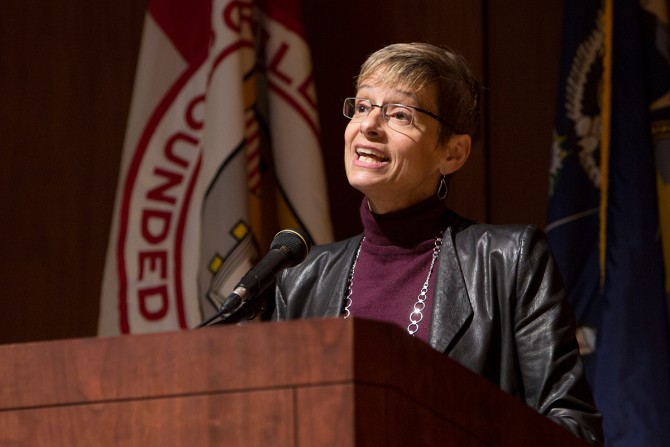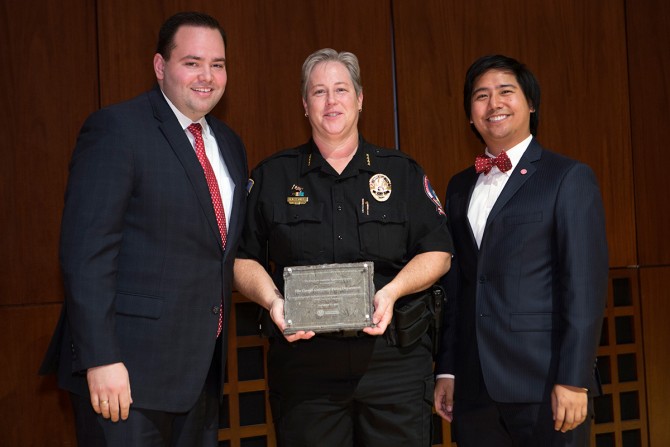Garrett thanks staff, empowers them to cut red tape
By Susan Kelley
An initiative to reduce the burden of bureaucracy at Cornell is not a one-time goal, but a way of operating for a modern university that wants to be “nimble, flexible, resilient and responsive,” President Elizabeth Garrett said in her first formal address to staff Nov. 13.
Staff are key to that effort, she said, pointing to work “on things that you just know could be done better. This is about empowering staff who may well know more about these things than faculty or students.”
Garrett emphasized that all staff play a role in the streamlining effort and, more importantly, in the success of the university. “Whether we care for the campus grounds or maintain advanced research equipment, counsel students or manage payroll or process travel reimbursements, motivate donors or carry out the myriad of other ways and functions in which a research university operates, we are all engaged in the academic mission and the academic enterprise. We are all citizens of the university and we are all contributors to that success,” she said.
Hosted by the Employee Assembly, about 600 staff gathered in Kennedy Hall’s Call Auditorium to hear Garrett’s address, which also was streamed live to 585 unique viewers.
Much of the address and many staff questions afterward focused on Garrett’s August memo, which asked provosts, deans and vice presidents to assess processes and procedures and to eliminate paperwork and other administrative burdens where goals can be met more effectively. Garrett has asked the leaders of the central administration and colleges to submit to her by Dec. 15 a detailed plan to reduce administrative costs and increase efficiency.
Several questions submitted by staff prior to the address touched on staff fear regarding streamlining. “For them, it resonated with staff layoffs,” said Billy Kepner, EA communications chair.
“[The memo] is not aimed at staff layoffs,” Garrett answered. “And you’ll also notice that it doesn’t talk about reduction in costs. … I really am focused on burden.”
Garrett also outlined several areas in which previous streamlining efforts have reduced bureaucratic fat, from the College of Agriculture and Life Sciences to the College of Veterinary Medicine and new features in e-SHOP that make buying supplies for campus more efficient.
She aims to increase the visibility of Cornell’s many efforts in the sustainability arena, and wants to find ways to celebrate staff, student and faculty successes, she said in answer to other questions. She encouraged staff to maintain their health and well-being with exercise, moving around while working, eating well, and taking time off and spending it with friends.
Garrett also suggested the campus community use email less frequently, to which the audience responded with strong applause. “It’s amazing what picking up the phone and talking to a person can do. You can resolve things more quickly,” Garrett said. Alternatives such as talking with colleagues in person can lead to a better workplace and better outcomes, she added.
She listed three recent awards that Cornell received reflecting the high quality of staff work, especially for Cornell’s efforts to create a more inclusive workplace. The 2015 Healthy Campus Award recognized Cornell’s public health approach to student health and well-being. The Dave Thomas Foundation, for the ninth year in a row, lauded Cornell for its adoption-friendly policies, and the HEED award recognized campus inclusion and diversity efforts.
“Thank you for the essential work you do across the university to keep Cornell at the forefront of American higher education. Your efforts support excellence in Cornell’s research, teaching and outreach, and you create an environment where faculty, students and staff together thrive,” Garrett said.
The event began with the presentation of the EA’s Employee Appreciation Award to the Cornell University Police Department. Chief Kathy Zoner accepted the award on behalf of the department. “From the Blue Light escorts to the chief and every member in between, we appreciate your support of the educational mission of the university and all you do to protect the community,” said Greg Mezey, EA executive vice chair.
Media Contact
Get Cornell news delivered right to your inbox.
Subscribe
